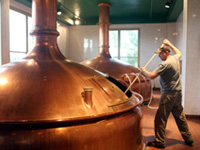University Course - The History and Science of Brewing
 The Science and History of Brewing (UNIV 3330) is designed to provide students with an historical, cultural and religious perspective on the use and abuse of alcohol, an understanding of the neuroscience of reward and addiction, and the actual biochemical process involved in brewing and consuming beer. For the university, it will open a new, cross-discipline area of education for students, spanning the Schools of Medicine and Arts & Sciences. This course will advance diversity by educating students on the way various cultures worldwide, past and present, produce and consume fermented beverages. It will make them aware of customs in other societies and among diverse human communities associated with this historical food. Students will also learn about the practices of other religions, particularly how fermented products play into their spiritual rituals and customs, and the environmental impacts of brewing globally and over long term history.
The Science and History of Brewing (UNIV 3330) is designed to provide students with an historical, cultural and religious perspective on the use and abuse of alcohol, an understanding of the neuroscience of reward and addiction, and the actual biochemical process involved in brewing and consuming beer. For the university, it will open a new, cross-discipline area of education for students, spanning the Schools of Medicine and Arts & Sciences. This course will advance diversity by educating students on the way various cultures worldwide, past and present, produce and consume fermented beverages. It will make them aware of customs in other societies and among diverse human communities associated with this historical food. Students will also learn about the practices of other religions, particularly how fermented products play into their spiritual rituals and customs, and the environmental impacts of brewing globally and over long term history.
Instructors
 Bruce Carter,
Professor of Biochemistry. Carter's research specialties include molecular mechanisms of neurotrophin signaling. He advises students regarding courses and scientific development, as well as tracking student progress. He also is available for advice on issues related to advancement to the degree, including helping students work more effectively with their advisors.
Bruce Carter,
Professor of Biochemistry. Carter's research specialties include molecular mechanisms of neurotrophin signaling. He advises students regarding courses and scientific development, as well as tracking student progress. He also is available for advice on issues related to advancement to the degree, including helping students work more effectively with their advisors.
 John Janusek, Associate Professor of Anthropology. Janusek is an archaeologist interested in the development of complex societies and cities in the South American Andes. His theoretical interests include: political ecology, urbanism, space and landscape, ritual practice, human agency / identity, household archaeology.
John Janusek, Associate Professor of Anthropology. Janusek is an archaeologist interested in the development of complex societies and cities in the South American Andes. His theoretical interests include: political ecology, urbanism, space and landscape, ritual practice, human agency / identity, household archaeology.
Course Overview
Key features:
- Fermentation and civilization go hand in hand. This course will trace the long history of brewing by comparing its various procedures in diverse human cultures, including ancient China, Egypt, Africa, Mesopotamia, Mesoamerica and South America.
- The course will study the linked biophysical and social transformations that brewing and consuming beer entail. It will explore in depth the biophysics of fermentation as well as the biological transformations that beer consumption has on human neural pathways. Such transformation are central to the role brewing and alcohol consumption have played in religious experience and political transformation cross-culturally and throughout history.
- Students will learn the history of brewing and beer consumption in Europe and the United States over the past few hundred years, focusing on key legal and political controversies and the macroeconomic vagaries attendant on the rise and fall of craft brewing over the past century.
- The course will examine the environmental parameters and ecological impacts of brewing, including its role in intensifying farming technologies, transforming landscapes and influencing ancient and more recent climate change.
- It will investigate the neurobiology of addiction and the neural pathways regulating the reward response, including the mechanisms by which alcohol affects humans acutely and chronically.
- Students will learn the fundamental biochemistry and microbiology of fermentation first-hand, by brewing a batch of beer in the laboratory. Class discussions will delve into the biology behind the sensory experience of flavor and attempts to systematically evaluate taste.
Degree requirements fulfilled:
- Blair School of Music: Counts as academic elective or a free elective credit toward the degree.
- College of Arts & Science: Counts as an elective toward the degree.
- Divinity School: Counts as a free elective credit for the Master of Divinity and Master of Theological Studies degrees.
- School of Engineering: Open elective credit.
- Anthropology major/minor: Counts as an elective credit toward the degree.
